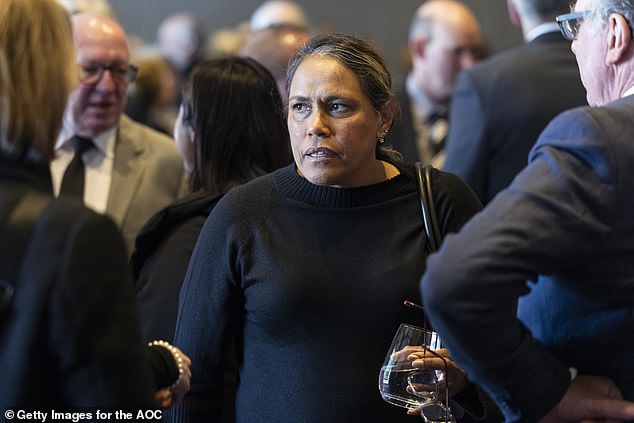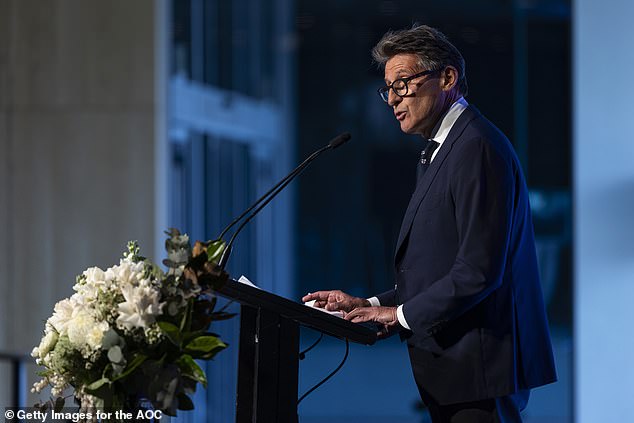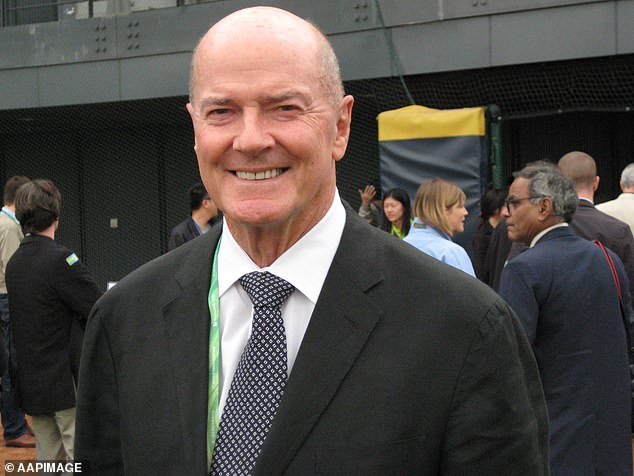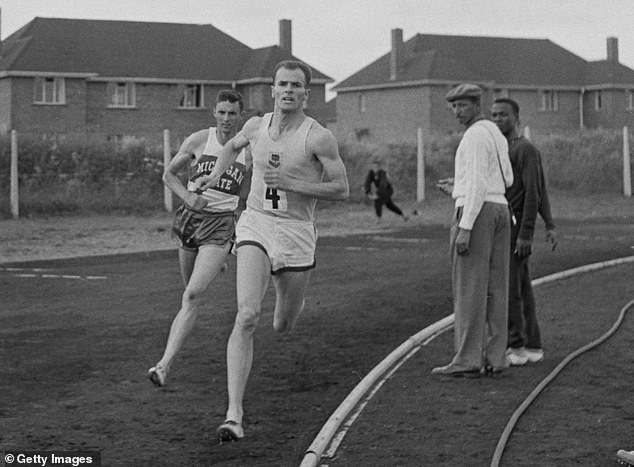Eddie McGuire plants a kiss on Cathy Freeman as Sydney hero goes without walking stick to pay tribute to Olympic Games legend at heartwarming memorial
- Cathy Freeman attended a memorial service on Tuesday
- Olympic hero paid tribute to Kevan Gosper in Melbourne
- She was greeted by Nine announcer Eddie McGuire
The stars gathered in Melbourne on Tuesday to pay tribute to Australian Olympic great and medallist Kevan Gosper.
Sydney heroine Cathy Freeman was in attendance at the poignant ceremony at the Melbourne Cricket Ground as Gosper’s family waved goodbye to their loved one after he passed away in July at the age of 90.
Former Collingwood president and TV presenter Eddie McGuire was spotted giving Freeman a kiss on the hand before the ceremony, which featured a speech by IOC presidential candidate Lord Sebastian Coe.
Freeman was unable to use the forearm crutch she previously used to walk after her surgery last year.
The athletics world gathered to remember Gosper, who won a silver medal with the Australian 4x400m relay team at the 1956 Melbourne Olympics and went on to become known as one of the country’s top sports administrators.
Gosper was a long-standing member of the International Olympic Committee and was also the first president of the Australian Institute of Sport from 1980.
Gosper was President of the Australian Olympic Federation and played a key role in the organisation of the Sydney 2000 Olympic Games, when he was Vice-Chairman of the Organising Committee.
Gosper served on the AOC board of directors for decades and was also an influential corporate executive.
Eddie McGuire greeted Cathy Freeman with a kiss during a memorial service on Tuesday

Sydney’s Olympic hero was at the MCG to remember Kevan Gosper

IOC presidential candidate Lord Sebastian Coe gave a speech at the ceremony
He is the former Chairman and CEO of Shell Australia and subsequently led the company’s operations in the Asia Pacific region while based in London.
Gosper also served as a director of companies such as Crown Resorts and Lion Nathan, but throughout his business life he remained passionate about the Olympic cause.
His work at the Sydney Olympics played a major role in the Games being declared ‘the best Games ever’ by then IOC President Juan Antonio Samaranch at the 2000 closing ceremony.
Gosper was appointed Officer of the Order of Australia in 1986 for services to sport and was inducted into the Sport Australia Hall of Fame three years later.
According to his Hall of Fame inscription, he was once “one of the world’s best 400m runners.” He won gold at the 1954 British Empire and Commonwealth Games and captained the Australian track and field team in Melbourne in 1956 and at the 1960 Rome Olympics.
Just before the 2000 Games, controversy arose around Gosper when his daughter Sophie surprisingly became the first Australian torchbearer at the last minute.
The Olympic great apologized but denied he had anything to do with the decision.
In a statement, AOC chairman Ian Chesterman said Gosper was a global figure within the Olympic movement.

Kevan Gosper (pictured) passed away at the age of 90 after a short illness

Before taking up roles as director of the Australian Institute of Sport, Gosper (pictured centre at the 1958 Empire Games) was a top runner
“Kevan was one of the true greats of the Olympic movement, not just in Australia but globally,” Chesterman said.
‘His loss will be felt deeply by so many of his friends who are gathering in Paris for the Olympic Games. There will be so many from all over the world who will have a heavy heart today with the news of Kevan’s passing.
‘Kevan’s impact in Australia was enormous, as a former president of the AOC and a lifelong servant of the sport in this country. But internationally his contribution was equally significant.
‘He rose to the top of the International Olympic Committee as an administrator, having distinguished himself in his sport, athletics. He took part in the Olympic Games twice and won a silver medal at the 1956 Melbourne Olympics.
‘Kevan’s record is remarkable. He became an IOC Member in 1977, served twice as IOC Vice-President and was also twice elected to the IOC Executive Board. He was involved in some of the biggest decisions of his time.’
